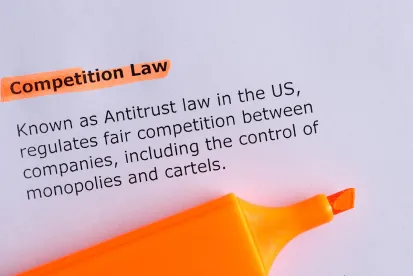United States
A. Federal Trade Commission (FTC).
1. FTC approves final order imposing divestitures following Global Partners LP’s acquisition of Wheels.
Following a public comment period, the FTC approved a final order settling allegations that Global Partners LP’s acquisition of 27 retail gasoline and diesel outlets owned or operated by Richard Wiehl violated federal antitrust laws.
Under the terms of the settlement, Global and Wiehl must divest to Petroleum Marketing Investment Group six Global retail fuel outlets and one Wheels retail fuel outlet. The FTC order also requires that the divestiture buyer obtain FTC approval before selling the divestiture assets under any circumstances for a three-year period and for a further seven-year period under certain circumstances.
First announced in December 2021, the FTC complaint alleged that the acquisition would have significantly increased concentration in markets for the retail sale of gasoline in the Connecticut towns and cities of Fairfield, Bethel, Milford, Wilton, and Shelton. Specifically, the FTC alleged that the proposed acquisition would have reduced competition from three to two players in three local markets for the retail sale of gasoline and in four local markets for the retail sale of diesel fuel. In the two other local markets, the FTC alleged that competition would have been reduced from four to three participants.
The Commission vote to approve the report was 4-0.
2. FTC and DOJ hold joint Spring Enforcers Summit.
The FTC and the Justice Department’s Antitrust Division cohosted a Spring Enforcers Summit April 4 to “facilitate discussions on modernizing merger guidelines and interagency collaboration.” The Summit included international enforcers and state attorneys general.
The Summit included discussions on how to work with industry regulators as part of a “whole of government” approach to competition policy, and followed the agencies’ joint announcement of their comprehensive overhaul of their merger guidelines.
3. FTC and DOJ also announce “listening forums” on effects of mergers and acquisitions.
The federal antitrust regulators announced in March a series of listening forums “to hear from those who have experienced firsthand the effects of mergers and acquisitions…including consumers, workers, entrepreneurs, start-ups, farmers, investors, and independent businesses.” The dates and industry focus for each forum are as follows:
-
Monday, March 28 – Food and Agriculture
-
Thursday, April 14 at 2 p.m. EDT – Health Care
-
Wednesday, April 27 at 1:30 p.m. EDT – Media and Entertainment
-
Thursday, May 12 at 2 p.m. EDT – Technology
The listening forums are open to the public, webcast on the FTC’s website, transcribed, posted online, and included as part of the public record.
4. FTC issues order requiring EnCap to sell off EP Energy Corp.'s Waxy crude oil business in Utah.
The FTC issued a proposed order requiring the divestiture of energy producer EP Energy Corp.’s entire business and assets in Utah, resolving FTC allegations that EnCap Energy Capital Fund XI, L.P.’s proposed $1.445 billion acquisition of EP Energy Corp. would eliminate head-to-head competition between two of only four significant producers for the sale of Uinta Basin waxy crude oil to Salt Lake City refiners.
EnCap is a private equity fund headquartered in Texas that operates multiple portfolio companies involved in the exploration, production, transmission, marketing, and sale of energy, particularly oil and gas. EP, also headquartered in Texas, has oil and natural gas production operations in the Uinta Basin in Utah and in the Eagle Ford Shale in Texas.
According to the FTC complaint, EP and EnCap, through its subsidiary XCL Resources Holdings, LLC, compete to develop, produce, and sell Uinta Basin yellow and black waxy crude oil to the Salt Lake City area, and the combination would reduce the number of significant producers from four to three, and increase estimated market share of waxy crude from 14% to approximately 40%. Notably, the FTC included in its press release a cartoon image from an internal XCL document boasting that the parties would “try to take over Utah” with the acquisition. The FTC stated that “[w]ithout this divestiture, Salt Lake City refiners would likely have faced increased prices for Uinta Basin crude oil, whether from EnCap alone, or as part of a small group – and would likely try to pass on those costs to consumers.”
Crescent Energy Company will acquire the divested assets. Crescent is an experienced operator in crude oil and natural gas production and will be a new entrant in the Uinta Basin. Crescent must obtain FTC approval before selling all of the divestiture assets under any circumstances for a three-year period and for a further seven-year period under certain circumstances.
B. Department of Justice (DOJ)
1. Justice Department supports “reciprocal switching” rules to address “highly concentrated” railroad market.
The DOJ’s Antitrust Division submitted comments to the Surface Transportation Board supporting proposed rules to facilitate switching between railroad tracks. According to the agency, U.S. railroads have become highly concentrated and railroad rates have more than doubled since 2002. The DOJ stated that the Board’s reciprocal switching proposal “is a well-tailored first step to provide captive shippers the benefit of some competition.”
2. Justice Department sues to block Verzatec’s proposed acquisition of Crane.
On March 17, the DOJ filed suit to block the acquisition by Grupo Verzatec S.A. de C.V. of its competitor Crane Composites, a wholly-owned subsidiary of Crane Co. Verzatec is a privately held Mexican corporation with headquarters in Monterrey, Mexico. Stabilit America Inc. is a wholly owned subsidiary of Verzatec based in Tennessee. Verzatec and its subsidiary Stabilit sell building materials and wall coverings, including pebbled fiberglass reinforced plastic (FRP) wall panels, in the United States under several business units, including Glasteel, Marlite, and Nudo. Crane sells pebbled FRP wall panels in the United States under several brand names, including Glasbord and Sequentia.
The complaint, filed in the U.S. District Court for the Northern District of Illinois, alleges that the proposed $360 million transaction would harm competition in the production and sale of pebbled FRP wall panels, which are used as wall coverings in restaurants, grocery stores, hospitals, and convenience stores. These panels are typically favored, according to the complaint, because of their “low cost, durability, and sanitary performance.”
Verzatec’s internal documents acknowledged that the transaction would eliminate the “fierce competition” between the parties. The agency also stated that Verzatec’s senior management wanted to acquire Crane to gain “pricing and market control” and to achieve “FRP dominance.” According to the complaint, Verzatec would control about 80% of current sales and production capacity of pebbled FRP wall panels in the United States as a result of the deal.
C. U.S. Litigation
1. Davitashvili v. Grubhub Inc., Case No. 20-cv-3000, 2022 U.S. Dist. LEXIS 58974 (S.D.N.Y. Mar. 30, 2022).
On March 30, 2022, U.S. District Judge Lewis Kaplan denied Grubhub, Uber Eats, and Postmates’ motion to dismiss, requiring the three companies to face an antitrust lawsuit by diners who accused them of driving up menu prices by exploiting their dominance in meal deliveries during the COVID-19 pandemic.
Judge Kaplan held it was reasonable to infer that requiring restaurants to accept “no-price competition clauses” left them with “no choice but to raise prices” regardless of where diners ordered meals. Diners claimed the no-price competition clauses barred restaurants from charging lower prices for dining in or ordering takeout, while Grubhub and Uber Eats also forbade restaurants from charging less to customers who ordered on rival platforms.
2. United States v. Penn, Case No. 20-cr-00152-PAB (D. Colo. Mar. 29, 2022).
On March 29, 2022, a federal court jury failed to reach a verdict in a criminal proceeding against 10 executives of various poultry companies who the federal government alleged engaged in a widespread price-fixing scheme. This is the second mistrial in this matter after another federal jury failed to reach a verdict against the same defendants in December 2021. Defendants have now moved for acquittal, arguing the government failed to introduce any evidence of an antitrust agreement.
3. In re Ranbaxy Generic Drug Application Antitrust Litigation, 1:19-md-02878-NMG (D. Mass. Mar. 23, 2022).
Sun Pharmaceuticals Industries, Ltd. settled a class action case for $485 million. The plaintiffs in the case – a group of generic drug buyers – alleged that Sun Pharma’s predecessor, Ranbaxy Laboratories, submitted faulty FDA approval filings to keep low-price generic drugs off the market. Sun Pharmaceutical purchased Ranbaxy in 2014. The settlement terms must still be finalized and require court approval.
4. Sidibe v. Sutter Health, Case No. 12-cv-04854-LB (N.D. Cal. Mar. 25, 2022).
A federal jury returned a verdict in favor of Sutter Health in a suit alleging Sutter Health used its market power to require health plans to exclusively use Sutter’s affiliated physicians and services. This type of antitrust claim – known as a tying arrangement – alleged that Sutter required insurers to contract with all of Sutter’s participants or none at all, meaning those insurers would pay higher out-of-network rates for medical services. At trial, Sutter argued that the above-referenced actions did not prevent robust competition and that Sutter never required an insurer to pay for an unwanted service in order to obtain another.
Mexico
A. COFECE fines Mexico City Airport for abuse of a dominant position (refusal to deal).
The Federal Economic Competition Commission (COFECE or Commission) ruled that the Mexico City International Airport (AICM) committed an abuse of dominance, or refusal to deal, by preventing a company from providing passenger bus and/or coach services to and from the airport and fined AICM USD45 million.
COFECE indicated that through different actions, AICM improperly refused to provide Transportación Terrestre UNE (UNE) access to provide services at the airport. AICM prevented UNE from offering passenger transport services between the airport and Puebla, establishing exclusive advantages in favor of two companies on the same route, isolating them from competition to the detriment of users.
According to the Commission, AICM has substantial power in the market for access to airport infrastructure to provide transport services. COFECE considered that by refusing to provide UNE access, without justification, AICM granted undue advantages to the incumbent permit holders, who maintained their position without competition. This decision resulted in fewer options and higher prices for users of the transport service.
Once notified of the resolution, AICM may ask the Federal Judiciary to review the Commission’s actions through a constitutional complaint.
B. COFECE recommends not approving the constitutional reform initiative on electricity due to the risks of impacting consumers and companies.
COFECE sent an opinion to the Mexican Congress opposing the proposal to amend articles 25, 27, and 28 of the Mexican Constitution in energy matters (the Initiative). COFECE warned that the proposal categorically renounces the model for competition in the market for electricity generation and supply (commercialization), replacing it with a vertically integrated industrial model operated by an unregulated state monopoly, which many countries have abandoned due to its inefficiency, inability to meet demand, high costs, and negative impact on public finances.
COFECE says the Initiative’s proposed model is against social welfare, because if approved it would:
-
establish a monopoly in the industry, i.e., in electricity generation, transmission, distribution, and supply (commercialization);
-
create a monopsony (single dominant buyer) in the purchase of electricity in the Federal Electricity Commission (Comisión Federal de Electricidad, CFE);
-
dismantle the institutional framework that protects the public interest, unduly transferring to the CFE regulatory, and public policy tasks, including the control and planning of the electricity system, as well as the determination of tariffs; and
-
eliminate different mechanisms that pursue fundamental objectives, such as ensuring system reliability, diversifying the generation matrix, ensuring equity among participants, applying neutral and technical regulation, improving service, and motivating investment in more efficient and cleaner generation technologies.
Moreover, COFECE states that the proposal does not include mechanisms to ensure that the electricity generated (both by CFE and, where appropriate, by private parties) and dispatched into the system is the least costly. On the contrary, according to COFECE, a change such as the one proposed would delay the exit of older, more polluting and inefficient generation plants from the market. It would also discourage the installation of new projects that could operate with more efficient and environmentally friendly technologies.
According to COFECE, the Initiative considers the cancellation of all existing generation permits and electricity purchase and sale contracts with the private sector, which would necessarily result in a restriction of supply, disablement of assets, and greater disincentives to investment. Although the Initiative foresees that the private sector would be able to generate “up to” 46% of the energy required by the country, this generation will only be for sale to the CFE and under the thresholds, terms, and conditions – as yet unknown – that the latter determines, which turns it into a monopsony in the purchase of electricity and thus allows it to monopolize the entire value chain.
COFECE adds that the shift would lead to increased costs along the electricity industry value chain, resulting in tariff increases that would harm consumers and the competitiveness of companies, or a diversion of resources to subsidize an inefficient public service. In short, according to the Commission, the Initiative would compromise the efficient functioning of the sector and its ability to meet present and future needs.
C. COFECE fines IAC Holdco, GCM, and Franklin for failing to file for competition clearance of a transaction in the auto parts industry.
In April 2018, GCM purchased and accumulated assets and/or control of IAC Holdco and its Mexican subsidiaries. Subsequently, in April 2019, Franklin Mutual Advisers sold GCM shares in IACNA, a firm that owns shares in IAC Holdco, which meant GCM had made another acquisition of IAC Holdco and its subsidiaries.
The Federal Law on Economic Competition (LFCE) sets economic thresholds for transactions that, if exceeded, require a company to file for competition clearance. The companies attempted to notify the Commission of the transactions post-implementation. COFECE reviewed the case to verify competition-rule compliance as well as to analyze the mergers’ potential impact on competition and free concurrence. COFECE found both transactions exceeded the threshold and that the failure to notify prevented it from a timely analysis of the transactions.
Notwithstanding the Commission’s finding that the mergers did not imply risks in this area and were therefore authorized, COFECE sanctioned the failure to file for competition clearance before they took place with an amount of $500,000.00.
The Netherlands
A. Dutch NCA decisions, policies, and market studies.
1. Companies allowed to reach agreements for sustainability.
On March 21, the European Commission (EC) issued a new proposal, supported by the Dutch Competition Authority (ACM), which leaves more room for companies to reach agreements for cooperation that involve sustainability matters. The proposal fits within Dutch guidelines on sustainability agreements, and the EC and ACM clearly signaled that competition laws should not obstruct sustainability progress. The ACM also proposes some additions to the exemptions, for example for agreements between companies that ensures that the companies and their suppliers comply with national and international requirements. The ACM is positive about the EC’s intention to let societal benefits be integrated into considerations when assessing sustainability agreements. Nonetheless, the ACM – as a progressive authority – believes that the EC could go even further and look at company needs regarding those agreements.
2. ACM introduces additional requirements for energy suppliers in upcoming legislation.
New and existing energy suppliers will have additional requirements to fulfill before supplying electricity or natural gas to consumers. These requirements, introduced by the ACM on March 23, will pertain to financial, organizational, and technical competencies of these suppliers, and include specifying their risk assessment as well as clarifying financial structures. The goal is to make energy suppliers more resilient to unexpected price increases in the energy market. The ACM will expand on the current legislative criteria for financial, organizational, and technical skills in policy regulation. A draft of the legislation is expected to be released in summer 2022, in advance of the Oct. 1, 2022 new heating season.
3. ACM fines Dutch trade association for pharmacies’ failure to notify ACM of acquisitions.
The ACM requires merging companies that exceed a certain turnover threshold to notify the ACM prior to making such acquisitions in order to assess whether sufficient competition will remain after the completion of those acquisitions. The Dutch trade association for pharmacies (VNA) did not notify the ACM prior to the acquisition of four pharmacies, and as a result, ACM fined the association EUR 350,000 on March 17. However, the VNA ultimately did notify the acquisitions, and after assessment, the ACM allowed the concentration, concluding that sufficient competition would remain.
B. Dutch Courts
1. Trade and Industry Appeals Tribunal (CBb) decides on publication of ACM market study.
On March 22, the ACM completed a market study for hospital information systems (Ziekenhuisinformatiesystemen), electronic patient filing systems (Elektronisch Patienten Dossier-systemen), as well as digital data exchange in the hospital sector. One organization active in that market has requested that the judge prevent publication of the study. The ACM has a legal authority to publish market studies if deemed necessary and useful for information and transparency purposes. The ACM did not find it disproportionally harmful to publish the results. The CBb, however, has partially granted the request to stop the publication of the market study and indicated that it needs more time to fully assess the issue at hand. Therefore, CBb has only allowed publication of the management summaries of the market study. This appears to be the first-ever ban in the Netherlands on a market study publication.
Poland
 A. Polish Competition and Consumer Protection Authority Investigates Photovoltaic Industry
A. Polish Competition and Consumer Protection Authority Investigates Photovoltaic Industry
In March 2022, the Polish Office of Competition and Consumer Protection (UOKiK President) announced that the authority is monitoring the photovoltaic market and called on entrepreneurs to respect consumer rights. The photovoltaic industry uses materials and devices to convert sunlight into electrical energy.
The investigation was prompted by an increasing number of customer complaints about the actions of photovoltaic companies in Poland (in 2021 UOKiK received approximately 120 complaints). The UOKiK President launched proceedings regarding an infringement of the collective interests of consumers against two Polish photovoltaic companies.
The UOKiK President’s allegations concern:
-
costs related to a consumer’s ability to withdraw from contracts (the contractual provisions of both companies may lead to the obligation to pay certain costs related to installation even before the lapse of the statutory 14-day period to withdraw from the contract free-of-charge);
-
obstruction of a consumer’s ability to withdraw from the contract (e.g., the UOKiK President suspects one of the investigated companies of making the withdrawal effective only if the consumer sends the declaration by registered letter or submits it at the company’s office, even though the law does not require such form);
-
offering a free audit regarding installation and the estimated demand for energy, whereas ultimately consumers are asked to pay for this service when they withdraw from the contract;
-
a lack of important information (such as written information about the procedure for handling complaints under the warranty).
Moreover, FG Energy is accused of making unauthorized references to government institutions, such as the Ministry of Climate and Environment, by suggesting it works with them.
Additionally, the UOKiK President launched preliminary investigations against 10 other companies. Their contract templates, offers, and practices are now being examined for possible violations of the collective interests of consumers and the use of prohibited clauses. The concerns relate to such issues as limiting warranty rights, suggesting links to government programs, making marketing calls without the consumer’s prior consent, not respecting the consumer’s right to withdraw from the contract, and charging consumers in such cases. Finally, photovoltaic companies often use telemarketing, which creates a risk of phishing and identity fraud.
The UOKiK President’s actions suggest that further steps in this matter in the coming months are likely. The case in question also proves the UOKiK President does consider individual consumer complaints if those complaints may prove that a given company’s practice leads to infringement of the collective interests of the consumer or use of prohibited clauses. Such complaints may result in a formal UOKiK investigation and a penalty of up to 10% of the company’s turnover in the preceding year. In such cases, UOKiK may also fine the company’s managers up to PLN 2 million, i.e., approx. €430 thousand.
B. UOKIK President Conditionally Clears PKN Orlen’s Merger with PGNiG
On March 15, 2022, the UOKIK President conditionally approved the merger between two state-controlled companies – PKN Orlen and PGNiG.
PKN Orlen is the Polish leader in the oil and petrochemical industry market, active across the supply chain for refined oil products in Poland, Austria, Czechia, Estonia, Latvia, Lithuania, Germany, and Slovakia. Orlen’s activities cover all fuel products typically processed at an oil refinery, and it has a network of retail fuel stations across Poland. PKN Orlen also produces a range of petrochemical products at its refineries in Poland and Czechia. It is also active in the electricity and gas markets. PKN Orlen is the biggest gas purchaser in Poland.
PGNiG is the main supplier of natural gas in Poland, at both wholesale and retail levels, and it is also the owner of all existing gas storage facilities in Poland. It has limited activities in the supply of natural gas in Lithuania, Germany, the Netherlands, Austria, Great Britain, and Ukraine. PGNiG is also active in the electricity supply chain in Poland and to a limited extent in the supply of certain refined oil products.
The transaction had an EU dimension, but subject to the parties’ reasoned submission pursuant to Article 4(4) of Regulation No 139/2004, the European Commission decided to refer it to the Polish antitrust authority. Although the Commission recognized a number of horizontally and vertically affected markets, the referral decision was ultimately justified by the transaction’s impact on Polish markets.
The approval is conditioned on certain measures including PGNiG relinquishing control over its Gas Storage Poland unit to ensure it does not restrict competition in the Polish gas market. The UOKiK President identified a risk that the merged entity could limit its competitors’ access to gas storage facilities on wholesale and retail gas sales markets.
Although Gas Storage Poland has been organizationally separated from PGNiG, the UOKiK President stated that the absence of ownership separation may create an incentive to favor a member of its own capital group in Gas Storage Poland’s activity.
UOKiK’s decision prohibits the potential buyer from operating in natural gas trading markets and requires the UOKiK President’s approval for such operation. This divestment will remain in force as long as the share of the merged entity in gas storage in Poland exceeds 40%.
This transaction is another step in PKN Orlen’s building of a multi-energy group. It was preceded by, inter alia, the acquisition of Energa S.A. in 2020 and the ongoing merger with Grupa LOTOS S.A.
Additional authors who contributed to this article: Yuji Ogiwara, Stephen M. Pepper, Yuqing (Philip) Ruan, Gillian Sproul, Hans Urlus, Dawn Zhang, Robert Hardy, Alan W. Hersh, Filip Drgas, Pietro Missanelli, Anna Rajchert, Mari Arakawa, Anna Bryńska, John Gao, Marta Kownacka, Jose Abel Rivera-Pedroza, Chazz Sutherland, Ippei Suzuki, Rebecca Tracy Rotem, Becky L. Caruso, Emily Willis Collins.







 />i
/>i

